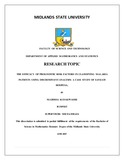Please use this identifier to cite or link to this item:
https://cris.library.msu.ac.zw//handle/11408/3239| Title: | The efficacy of prognostic risk factors in classifying malaria patients using discriminant analysis: a case study of Sanyati hospital | Authors: | Mazibisa, Kudakwashe | Keywords: | Malaria Malaria patients Prognostic risk |
Issue Date: | 2017 | Publisher: | Midlands State University | Abstract: | Malaria is endemic in Sanyati, accounting to approximately 3000 patients both outpatient attendance and admissions diagnosed of the disease yearly and 15% of all hospital deaths. The research analyzed the efficacy of prognostic risk factors in classifying malaria patients into low and high risk groups using discriminant analysis: a case study of Sanyati Baptist Hospital. Secondary data was extracted from the inpatient morbidity and mortality register available in the information department from 1st of January 2013 to 31st December 2015. The results showed that prognostic factors that are age, distance, referral status, disease comorbidity were important predictors of malaria mortality and patient survival. However, it was found that the prognostics risk factors; gender, site of residence and number of reported symptoms were not good predictors of predicting whether a patient is in the high or low risk class. It was recommended, among other things that the hospital executives should implement the patient classification system to reduce malaria related deaths through effective distribution of scarcity drugs and doctors at Sanyati Baptist Hospital. | URI: | http://hdl.handle.net/11408/3239 |
| Appears in Collections: | Bsc Mathematics Honours Degree |
Files in This Item:
| File | Description | Size | Format | |
|---|---|---|---|---|
| Final draft of my dissertation.pdf | Full Text | 1.64 MB | Adobe PDF |  View/Open |
Page view(s)
198
checked on Feb 14, 2026
Download(s)
152
checked on Feb 14, 2026
Google ScholarTM
Check
Items in MSUIR are protected by copyright, with all rights reserved, unless otherwise indicated.



